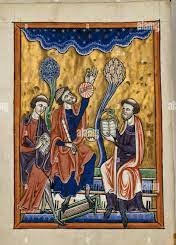Little is known about
this German Jew who lived about 1400 and was an alchemist, magician, and
philosopher.
The majority of what is known comes from a manuscript held
in the Archives of the Bibliotheque de l'Arsenal in Paris, a repository of
esoteric texts.
The manu script, written completely in French, claimed to be a translation from Hebrew, and the handwriting style suggests that the writer lived in the early eighteenth century, if not earlier.
The French script has a distinct illiteracy to it, with
punctuation that is either incorrect or visibly lacking.
Abraham was most likely a Mayence native, and he was born
about 1362.
His father, Simon, was a seer and magician, and the
youngster began his esoteric studies under his father's tutelage, then later
under the tutelage of another teacher, Moses, whom Abraham characterizes as
"truly a nice man, but utterly unaware of The True Mystery, and of The
Veritable Magic." After that, Abraham chose to travel to further his
studies.
He traveled via Austria and Hungary with his buddy Samuel, a
Bohemian by origin, through Greece, and then to Constantinople (now Istanbul),
where he stayed for two years.
After that, Abraham journeyed to Arabia, a well-known center
of mystic study at the time, and then to Palestine and Egypt.
In Egypt, he met Abra-Melin, a great Egyptian philosopher,
who entrusted him with important papers and revealed a lot of vital secrets.
Abraham then left Egypt for Europe, finally settling in
Würzburg, Germany, where he got extensively immersed in alchemy study.
He had three daughters and two sons, the older called Joseph
and the younger Lamech, after marrying a lady who seems to be his cousin.
He trained both sons in esoteric matters, and he bestowed a
dowry of 100,000 golden florins on each of his three daughters.
He claimed to have gained this substantial fortune, as
well as other huge wealth, while traveling as an alchemist.
He was well-known and was asked to do magical deeds in front
of many wealthy and powerful individuals, including Emperor Siegmund of
Germany, the bishop of Würzburg, King Henry VI of England, the Duke of Bavaria,
and Pope John XXII.
There are no details concerning the remainder of Abraham's
life, and his death date is unknown, although it is widely assumed to have
occurred about 1460.
The Book of the Sacred Magic of Abra-Melin, as bequeathed by
Abraham the Jew unto his son Lamech, is the title of the book that supplied
this biographical information.
This title is deceptive and inaccurate, since Abra-Melin had
no involvement in the work's introductory section, which includes a description
of Abraham's boyhood and early journeys in quest of enlightenment, as well as
guidance to a young man striving to become expert in esoteric arts.
The second section, on the other hand, is either based on
the records given to Abraham by Abra-Melin or on the secrets revealed to
Abraham by the Egyptian sage.
"How Many, and What are the Classes of Veritable
Magic?" is one of the chapters in this section of the manuscript, which
deals with the fundamentals of magic in general.
"What we Should Consider Before Conducting the
Operation," "Concerning the Convocation of the Spirits," and
"How We Should Conduct the Operations." The third and last section of
the paper is primarily taken directly from Abra-Melin, and the author, avoiding
theoretical matters as much as possible, focuses on practical magic practice.
First and foremost, he explains how to "get various
Visions," "retain the Familiar Spirits, bound or free, in whatever shape,"
and "excite Them bugs." In other chapters, he talks of reviving the
dead, transforming into "divers shapes and forms," flying through the
air, smashing buildings, finding robberies, and swimming underwater.
The author discusses the thaumaturgic treatment of leprosy,
dropsy, paralysis, and a variety of other maladies including fever and
seasickness.
He also gives tips on "How to Be Loved by a
Woman," as well as how to gain the favor of popes, emperors, and other
powerful figures.
In "How to induce Armed Men to Appear," he answers
the question of summoning visions and explains how to conjure "Comedies,
Operas, and all types of Music and Dances." Many of these achievements are
accomplished via the use of Kabalistic letter squares.
Many distinct symptoms of this kind are detailed in the
book.
As described in this book, Abraham's demeanor and
temperament depict a guy who scorns most other magicians and speaks with great
mockery of practically all spiritual works other than his own and those of his
hero, Abra-Melin.
Abraham harshly condemns anybody who denies the faith in
which they were reared, claiming that no one who does so would ever be able to
master magic.
Nonetheless, Abraham exhibits minimal selfishness throughout
the writings and seems to have labored for accomplishment in his skill in order
to use it for the good of humanity as a whole.
His works also indicate a strong conviction in the existence
of a higher self in every individual, as well as a strong desire to develop it.
(Also see Nicholas Flamel.)
Further Reading:
The Book of the Sacred Magic of Abra-Melin the Sage. Translated by S. L. MacGregor-Mathers. Chicago: De Laurence, 1932. Reprint, New York: Causeway Books, 1974.
You may also want to read more about parapsychology and occult sciences here.


